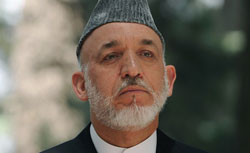Posted Monday, July 18, 2011, at 4:11 PM ET
 Gen. David Petraeus stepped down as commander of U.S. and NATO forces in Afghanistan on Monday, just as the Taliban's strength seems to be on the rise. The militants' growing power comes not from conventional military victories—on that score, Petraeus has racked up considerable advances in the past year—but, rather, from what may be a shift in the real war that's going on: the war for the favor (or at least complicity) of the Afghan people.
Gen. David Petraeus stepped down as commander of U.S. and NATO forces in Afghanistan on Monday, just as the Taliban's strength seems to be on the rise. The militants' growing power comes not from conventional military victories—on that score, Petraeus has racked up considerable advances in the past year—but, rather, from what may be a shift in the real war that's going on: the war for the favor (or at least complicity) of the Afghan people.The high-profile assassinations this past week of President Hamid Karzai's brother and one of his close associates send a clear message to Afghan people who are sitting on the fence: If Karzai and the American military can't protect powerful guys like this, they certainly can't protect you. If this perception deepens, it may be game-over not just for Karzai's regime but for the U.S.-NATO war effort.
Most insurgency wars are wars for the allegiance or control of the people. They are, in part, fought the same way all wars are fought, with combatants on two or more sides trying to kill one another. But the metrics of success are very different. These wars, ultimately, are not about conquering territory (insurgents hold no territory) or winning battles (insurgents fight battles of their choosing and can simply melt into the population if they figure the odds are against them). The "center of gravity," as strategists put it, is the population.
No hay comentarios:
Publicar un comentario